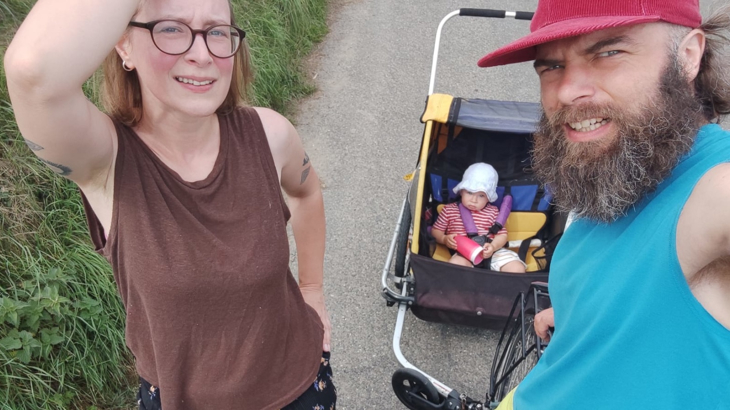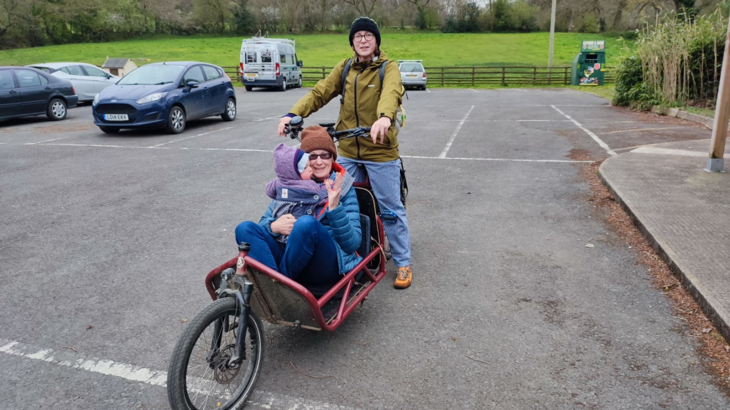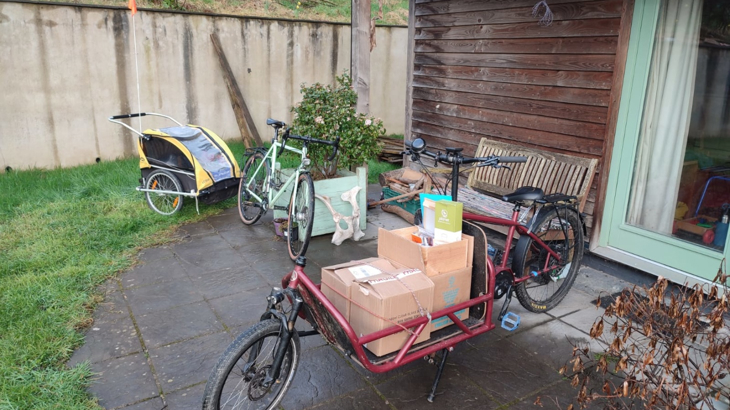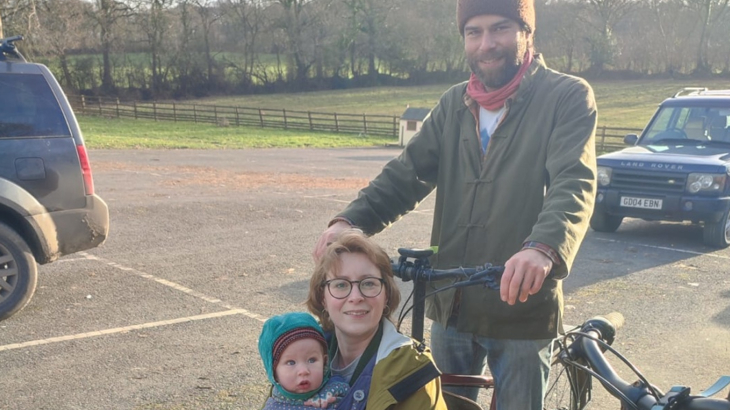Although going completely car-free isn’t possible for everyone, changing some of our car trips for active travel journeys can have huge benefits to our health, the environment and the health of others. In this blog, a family from South Wales tell us about their car-free lifestyle and how they use their cargo bike to run their small business and to get around with their one-year-old.

The Greenfield family, Albert, Rosemary and Teifi don’t own a car and do everything by pedal power. Credit: Rosemary Greenfield
Reducing our car use reduces the amount of pollution in the air, which benefits everyone and the environment too.
Amid the cost-of-living crisis, reducing our car use is also likely to help us save money.
The Greenfield family don’t own a car and do everything by pedal power.
Albert and Rosemary run a fermentation business from their home in South Wales.
They sell their products at local market stalls and shops all within 10 miles of their home.
They believe that cycles should be viewed as practical modes of transport and not just for leisure.
Embracing local journeys
Albert and Rosemary have never owned a car.
They find that their electric cargo bike and non-electric bike not only help them practically, but also help to reduce stress, boost their mental health and connect them with their community.
Albert explains:
“Since we got our cargo bike in January, relying on our bikes to get around has meant that we’re becoming more local with a lot of things we do.
“As a family, we’ll do the weekly food shop together with the cargo bike.
“Each time we come home afterwards, I get back feeling a sense of achievement and a rush of endorphins.
“Doing a weekly food shop all in one go obviously takes a lot more planning and checking different shops are open, but it’s an amazingly small thing that can have a massive impact on your wellbeing.
“Having our Ariel Cargo Bike has had a massive impact on our ability to do things.
“For example, with our small business we can shift up to 50kg of products around to market stalls – which would be a real struggle with a manual bike.
“Cargo bikes are expensive, but it’s because they're work vehicles.
“We use ours every day, so it’s definitely been a worthwhile investment.
“Bikes need to move away from being seen as a leisure thing – they are practical modes of transport too."

“Since we got our cargo bike in January, relying on our bikes to get around has meant that we’re becoming more local with a lot of things we do." Credit: Rosemary Greenfield
Slowing down
Albert continues:
“Cycling rather than driving slows down your journey and I think that has huge benefits in changing your perception and how stressed and busy you feel.
"We don’t always need to be going long distances.
“Slowing down allows you to better connect to the community around you, investigate what your area has to offer, and gives you more headspace to think.
"I think it’s vital to slow down in the modern world where it’s easy to get caught up in the rush of an instantaneous lifestyle."
Normalising bike use for everyday trips
Despite a “lack of cycling infrastructure” and his local area being “really hilly”, Albert believes the more people cycle, the more likely others will be encouraged to do the same:
“There are hardly any people cycling around here.
“It’s easier to feel scared on the roads, especially if drivers don’t know how to act around cyclists as they just don’t see that many.
“It’s important for us to get out on our bikes and to normalise it.
"Lots of people say to us ‘you couldn’t possibly live where you do without a car' and are amazed at how we function without one - with it being very rural and car-centric around here.
"But we run our small fermentation business and do all our day-to-day transport using our cargo bike and non-electric bike.
“But I’m aware that not everyone has the option to do that.
"I'm my own boss and I'm in a privileged position to be able to have the choice to commute in this way and to not have to rely on a car."
Living a car-free lifestyle with a child
Since becoming a parent, Albert says the need to live without a car is even more important to him.
He explained:
“I’ve been cycling around with my little boy on the back of our bike since he was three months old.
“Having a child has made the way we live even more important.
“For me now, it’s essential that I don’t have a car – so that it’s not normalised for my little boy to have one.
“Hopefully he’ll take that with him into the future too."

Albert believes the more people cycle, the more likely others will be encouraged to do the same. Credit: Albert Greenfield
Saving the planet by ditching the car
Our latest Walking and Cycling Index found that a total of 310,000 tonnes of greenhouse gas emissions are saved annually by walking or wheeling instead of driving.
That’s the equivalent of 370,000 people taking flights from London Heathrow to New York.
For a long time, towns and cities have been designed around cars, leaving less space for walking, wheeling and cycling.
Car-dominated spaces create congestion - damaging our environment and our health.
This pollution harms people who are already disadvantaged the most.
Our cities and towns should be designed with everyone’s health and wellbeing at the front and centre.
Tips on going car-free
For those feeling inspired to make more active journeys, Albert offers some advice for leaving the car at home.
He suggests starting with making small changes:
"Try doing one trip a week on bike instead of in a car, that could maybe be a trip to the shops to get a smaller amount of things in or taking the kids to the park.
"I’d recommend starting off small and slowly reducing the number of trips you take in the car.
"Obviously it does depend on where you are, but you can certainly give it a go.
"I guess it's important not to see it as this massive challenge and more just making small tweaks.
"It does involve changing habits and making adaptations, but it is doable."

Although switching to a car-free lifestyle isn’t possible for everyone, swapping some of our car trips for active travel journeys can have huge benefits to our health and the health of others. Credit: Rosemary Greenfield
The benefits of cycling on mental health
Albert, who grew up in Pembrokeshire where he now lives with his family, reminisces on a time when cycling was a means of getting around, rather than a way of life.
He was working a stressful full time job in the city and could feel the hustle and bustle of his fast-paced life "becoming too much."
He said:
"I was in a well-paid job and was sucked into the contract lifestyle.
"I didn't realise until I gave it all up to go on a bikepacking trip around Europe with my partner, how much that lifestyle was having a negative impact on my mental health.
"Getting on my bike and carrying only the essentials needed to survive - all of my worries just started to fizzle away.
"Each day all I was thinking was 'what am I going to eat' and 'where am I going to sleep'.
"In our modern, Western culture you aren't often faced with many opportunities to strip back your life to the basics - you're always connected and attached to things, that we could all live without.
"That cycle trip cemented that cycling means so much more to me and that I couldn't continue that way of living."
Albert and Rosemary's trip, in which they did the occasional job and volunteering, turned into a five year adventure.

“For me now, it’s essential that I don’t have a car – so that it’s not normalised for my little boy to have one. Hopefully he’ll take that with him into the future too." Credit: Rosemary Greenfield





